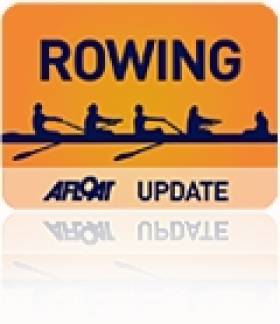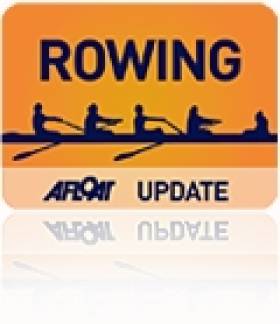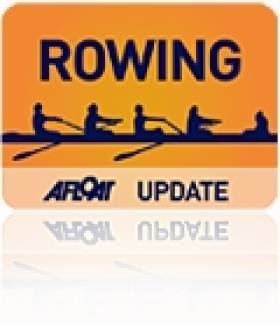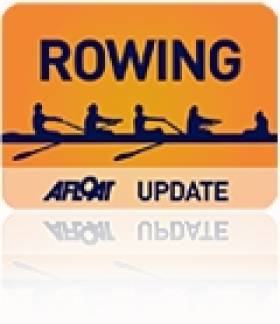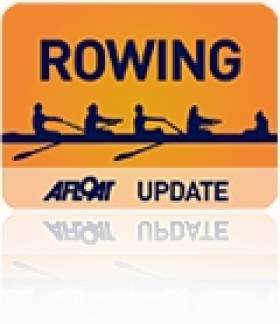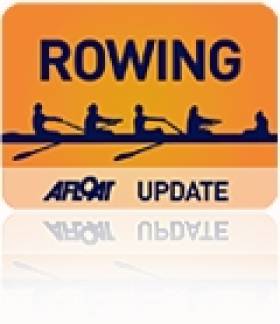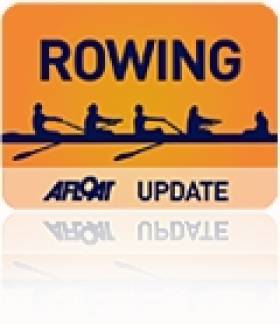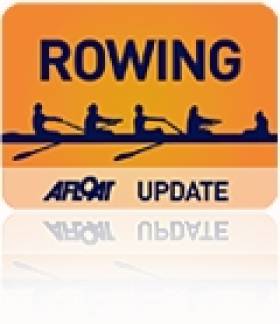Displaying items by tag: O'Donovan
Rio Olympians Sign Up for Irish Indoor Rowing Championships
#Rowing: The entry for the Irish Indoor Rowing Championships has both quantity and quality, with Irish rowers who are set to compete at the Olympic Games in the mix. Gary O’Donovan will compete in lightweight class and Paul O’Donovan in the under-23 lightweight class.
Claire Lambe, who partnered Sinéad Jennings in the Ireland lightweight women’s double crew which qualified the boat for Rio, is also entered. Jennings may do a Wattbike test.
Among the heavyweight men, Philip Doyle, Sam McKeown and Dave Neale will be among those competing to set the top mark, while Sanita Puspure, an Olympian in 2012, should be the fastest woman.
The Championships have a record entry and will be held in Limerick on January 23rd.
Ireland Lightweight Doubles are Afloat Rowers of the Month
#Rowers of the Month: The Afloat Rowers of the Month for September are the Ireland men’s and women’s lightweight double sculls (Paul and Gary O’Donovan; Sinéad Jennings and Claire Lambe) which qualified their boats for the Olympic Games. Both crews faced challenges in their quest to be in the top 11 at the World Championships in Aiguebelette; both overcame them.
Jennings, a mother of three young children and a doctor, returned to the sport last year targeting a place in Rio. She broke a rib early this year. For another athlete this might have meant abandoning her punishing schedule. Jennings (then 38) redoubled her efforts. She excelled on the Wattbike at the Irish Indoor Championships and competed at the European Championships in a lightweight single. She came through a two-race trial to qualify for the lightweight double. Lambe and Jennings teamed up at the World Cup in Lucerne and finished seventh. It was a promising result, but this was their first time competing together. In the semi-final at the World Championships, they were outsprinted to the line by Canada, and missed out on an A Final spot. For the B Final, the tactics were to be in the leading group until the end. They did it. Their third place secured the precious slot in Rio for the Ireland women’s lightweight double.
Paul and Gary O’Donovan produced one of the greatest performances in Irish rowing by taking third place in their quarter final in Aiguebelette. With just a season of competition as a crew behind them, Gary (22) and Paul (21) were able to find a sprint finish which ousted New Zealand from a chance of qualifying their boat. In the B Final, the O’Donovan brothers stayed with the leaders until the finishing sprint, where they showed tremendous grit to take fifth (11th overall), .28 of a second ahead of Greece.
Well done to all the Ireland team and to the two crews which are the Afloat Rowers of the Month.
Rower of the Month awards: The judging panel is made up of Liam Gorman, rowing correspondent of The Irish Times and David O'Brien, Editor of Afloat magazine. Monthly awards for achievements during the year will appear on afloat.ie and the overall national award will be presented to the person or crew who, in the judges' opinion, achieved the most notable results in, or made the most significant contribution to rowing during 2015. Keep a monthly eye on progress and watch our 2015 champions list grow.
O'Driscoll and O'Donovan Sixth in Lucerne A Final
#Rowing: Mark O’Donovan and Shane O’Driscoll finished sixth in the A Final of the men’s lightweight pair at the World Cup in Lucerne. Britain and Italy fought it out for gold, with Italy winning. Denmark took bronze. The Ireland crew were in sixth through the four quarters.
Denise Walsh finished 4th in her B Final, 10th overall in the lightweight single sculls.
World Cup Regatta, Lucerne – Day One (Irish interest; selected results)
Men
Lightweight Pair – Repechage (First Four to A Final): 4 Ireland (M O’Donovan, S O’Driscoll) 6:50.28. A Final: 1 Italy 6:54.52, 2 Britain 6:54.71, 3 Denmark 6:56.81; 6 Ireland 7:14.15.
Lightweight Double Sculls – C Final (Places 13 to 18): 2 Ireland (G O’Donovan, P O’Donovan) 6:23.91.
Women
Pair – C Final (Places 13 to 18): 5 Ireland (H Hannigan, L Dilleen) 7:29.47.
Double Sculls – A/B Semi-Final (First Three to A Final; rest to B Final): 1 Belarus 7:14.98, 2 Germany 7:17.52, 3 Greece 7:19.13; 5 Ireland (H Hannigan, L Dilleen) 7:26.75.
Lightweight Double – A/B Semi-Final (First Three to A Final; rest to B Final): 1 South Africa 7:35.26, 2 US 7:36.79, 3 Germany 7:39.14; 5 Ireland (C Lambe, S Jennings) 7:44.11
Single Sculls – A/B Semi-Final (First Three to A Final; rest to B Final): 1 Australia (K Crow) 7:55.81, 2 United States (G Stone) 8:00.20, 3 New Zealand (F Bourke) 8:03.10; 5 Ireland (S Puspure) 8:11.50.
Lightweight Single – Repechage One (Two to A Final; rest to B Final): 3 Ireland (D Walsh) 8:11.47. B Final (Places 7 to 12): 1 South Africa (K Johnstone) 8:34.06; 4 Ireland (Walsh) 8:39.41.
#Rowing: Gary and Paul O’Donovan qualified for the quarter-finals of the World Cup regatta in Lucerne with a second-place finish in their heat of the lightweight double sculls. Norway won well and Ireland took over ahead of Portugal in the final quarter and held off a push by the Portuguese.
Sinéad Jennings and Claire Lambe had just one qualification place, for the semi-finals, on offer in their heat of the lightweight double. South Africa held off Ireland and Denmark at the head of the field, with Ireland testing the eventual winners.
World Cup Regatta, Lucerne – Day One (Irish interest; selected results)
Men
Lightweight Pair – Heat One (First Directly to A Final; rest to repechages): 1 France 6:45.55; 2 Ireland (M O’Donovan, S O’Driscoll) 6:56.04
Lightweight Double Sculls – Heat Five (First Three Directly to Quarter-Finals): 1 Norway 6:17.32, 2 Ireland (G O’Donovan, P O’Driscoll) 6:20.20, 3 Portugal 6:21.09.
Women
Pair – Heat Three (First Two Directly to A/B Semi-Finals; rest to repechages): 1 Denmark 7:09.27, 2 South Africa 7:16.71; 6 Ireland (L Kennedy, M Dukarska) 7:44.68
Lightweight Double Sculls – Heat One (First directly to A/B Semi-Finals; rest to repechages): 1 South Africa 6:54.01; 2 Ireland (C Lambe, S Jennings) 6:57.98
O'Donovan Brothers Best Scullers at Cork Regatta
#ROWING: Paul O’Donovan of UCD and his brother Gary, representing Skibbereen, finished first and second in the single sculls at Cork Regatta at the National Rowing Centre today, with another Skibbereen oarsman, Erik Rowan, third. Reigning Irish champion John Keohane was fourth in a race run in a very strong tailwind. The women’s single also went to Skibbereen, in the form of 16-year-old Emily Hegarty. There were timing problems, which saw the men’s and women’s pairs finals run off on the draw made for the heats.
Cork Regatta, National Rowing Centre (Selected Results)
Saturday
Men
Eight – Div Two – A Final: 1 Commercial (Club Two) 6:07.87, 2 St Michael’s (Club Two) 6:14.16, 3 UCD (nov) 6:17.04. B Final: St Joseph’s (jun 16) 6:21.33.
Pair – Division One (run on heat seeding): 1 Skibbereen/Old Collegians (sen) 6:33.2, 2 UCC A (inter) 6:52.3, 3 Commercial (sen) 6:53.2; Jun 18A: St Joseph’s 7:09.2.
Sculling,
Single – Div One – A Final: 1 UCD (P O’Donovan, sen) 6:55.74, 2 Skibbereen (G O’Donovan) 7:03.20, 3 Skibbereen (E Rowan) 7:11.35; 5 Skibbereen (J Ryan; lightweight) 7:15.57. B Final: Athlone (Munnelly; jun 18A) 7:18.86; 4 Lee (O’Sullivan; inter) 7:30.85; 5 Carlow (Keating; Club One) 7:34.12. C Final: Skibbereen (McCarthy; light) 7:22.83.
Women
Pair – Div One – Final (run on heat seeding): 1 Trinity A (sen) 7:38.43, 2 Trinity B (sen) 7:48.19, 3 Shannon B (sen) 7:50.06; Jun 18A: Skibbereen 7:50.10; Club One: UCC 8:04.18.
Sculling
Quadruple – Div Two – A Final: 1 Cork A (jun 16) 7:26.15; 3 Methody (jun 18B) 7:43.65; 5 Garda (Club Two) 7:49.65. B Final: Galway (jun 16) 7:59.76. C Final: Clonmel (Nov) 8:37.90.
Single – A Final: Skibbereen (E Hegarty; jun 18A), 2 Belfast BC (S Quinn; light), 3 Belfast BC (K Turner; light); 6 Castleconnell (Vascotto; jun 18A). B Final: Skibbereen (A Casey; jun 18A); 2 St Michael’s (A O’Sullivan; sen); 6 Belfast BC (O Blundell; Club One). C Final: Neptune (C Feerick; jun 18A); 3 Methody (C Deyermond; inter).
Fifth Place in European Final for O'Donovan Brothers
#Rowing: The Ireland lightweight double of Paul and Gary O’Donovan finished fifth in the A Final at the European Rowing Championships in Poznan, Poland, this morning. France set a new European best time with a classy win, while Britain (with Richard Chambers in the bow seat) took silver. Ireland were in sixth through the first three quarters of the race but passed Turkey in the final 500 metres.
In the women’s lightweight doubles, Ireland’s Claire Lambe and Denise Walsh finished sixth. They had held that position through the race. In a race won with a runaway performance by Britain’s Charlotte Taylor and Kat Copeland, Ireland were in touch with the rest of the field until the closing stages when they did not match the finishing speed of the other five crews.
Joel Cassells and Peter Chambers won the lightweight pair for Britain. Both had represented Ireland at underage level.
European Rowing Championships, Poznan, Day Two (Irish interest)
Men
Lightweight Pair – A Final: 1 Britain (J Cassells, P Chambers) 6:28.58.
Lightweight Double Sculls – A Final: 1 France (S Delayre, J Azou) 6:11.38, 2 Britain (R Chambers, W Fletcher) 6:14.33, 3 Norway 6:15.53; 5 Ireland 6:21.89.
Women
Pair, B Final (Places 7 to 12): 1 Czech Republic 7:16.56, 2 Spain 7:17.04, 3 Ireland (L Kennedy, M Dukarska) 7:20.37.
Lightweight Double Sculls – A Final: 1 Britain 7:00.71, 2 Germany 7:05.27, 3 Poland 7:05.36; 6 Ireland (C Lambe, D Walsh) 7:13.41.
Lightweight Single Sculls, B Final (Places 7 to 12): 1 Denmark (R Holmegaard) 7:40.62, 2 Ireland (S Jennings) 7:45.64, 3 Netherlands 7:49.94.
#Rowing: Ireland’s men’s and women’s lightweight double sculls qualified for A Finals at the European Rowing Championships in Poznan, Poland this morning. The O’Donovan brothers, Paul and Gary, raced very well, putting themselves into contention for a crucial third place in the middle of the race, and then securing it with a good closing 500 metres. Britain’s William Fletcher and Richard Chambers won well. Claire Lambe and Denise Walsh had to come through an exciting finish to secure third. Poland won, with Denmark, Ireland and Russia taking the second to fourth placings. Ireland were just .17 of a second ahead of Russia on the line.
The Ireland women’s pair of Monika Dukarska and Leonora Kennedy finished fifth in their semi-final, and Sinéad Jennings fourth in the semi-final of the lightweight women’s single sculls.
European Rowing Championships, Poznan, Day Two (Irish interest)
Men
Lightweight Double Sculls – A/B Semi-Final One (Three to A Final; rest to B Final): 1 Britain (R Chambers, W Fletcher) 6:16.83, 2 Norway 6:21.02, 3 Ireland (P O’Donovan, G O’Donovan) 6:22.89; 4 Czech Republic 6:27.58, 5 Austria 6:31.75, 6 Greece 6:41.41.
Women
Pair – A/B Semi-Final One (Three to A Final; rest to B Final): 1 Netherlands 7:05.80, 2 Romania 7:09.40,3 France 7:13.10; 4 Czech Republic 7:14.97, 5 Ireland (L Kennedy, M Dukarska) 7:30.00, 6 Germany 7:34.45.
Lightweight Double Sculls – A/B Semi-Final One (Three to A Final; rest to B Final): 1 Poland 6:58.39, 2 Denmark 7:02.24, 3 Ireland (C Lambe, D Walsh) 7:02.82; 4 Russia 7:02.99, 5 Romania 7:03.82, 6 Czech Republic 7:17.73.
Lightweight Single Sculls – A/B Semi-Final One (Three to A Final; rest to B Final): 1 Russia 7:42.99, 2 Lithuania 7:44.09, 3 Britain 7:44.62; 4 Ireland (S Jennings) 7:45.99, 5 Austria 7:58.39, 6 Latvia 8:02.81.
O'Donovans Win Through With Another Sprint Finish
#ROWING: Paul and Gary O’Donovan again left it late, but made it through to the A/B semi-finals of the European Rowing Championships in Poznan, Poland, today. The Ireland lightweight double were off the pace in the first half of their six-boat repechage. But at the finish, as Austria and Switzerland claimed the first two of the three qualifying places, Ireland came through to take third – by .37 of a second.
European Rowing Championships, Poznan, Day One (Irish interest)
Men
Lightweight Four – Heat One (First Three Directly to A/B Semi-Finals; rest to Repechage): 1 Britain 6:07.57, 2 Germany 6:09.56, 3 Russia 6:09.72; 4 Austria 6:25.53, 5 Ireland (M Bailey, A English, M O’Donovan, S O’Driscoll ) 6:38.91.
Lightweight Double Sculls – Heat Three (Two Directly to A/B Semi-Finals; rest to Repechage): 1 France 6:20.55, 2 Czech Republic 6:27.16; 3 Ireland (P O’Donovan, G O’Donovan) 6:28.06, 4 Greece 6:41.16, 5 Poland 7:04.83. Repechage (Three to A/B Semi-Finals; rest to C Final): 1 Austria 5:54.92, 2 2 Switzerland 5:457.02, 3 Ireland 5:58.15; 4 Poland 5:58.52, 5 Denmark 6:00.12, 6 Ukraine 6:13.88.
Women
Pair – Heat Three (First Three Directly to A/B Semi-Finals; rest to Repechage): 1 Netherlands 7:12.68, 2 Spain 7:16.31, 3 Ireland (L Kennedy, M Dukarska) 7:17.07; 4 Poland One 7:17.84.
Double Sculls (First Three Directly to A/B Semi-Finals; rest to Repechage): 1 Poland 6:49.73, 2 Britain 6:53.58, 3 Serbia 6:55.67; 4 Romania 7:06.54, 5 Ireland (H Hannigan, L Dilleen) 7:24.08.
Lightweight Double Sculls (First Three Directly to A/B Semi-Finals; rest to Repechage): 1 Poland 7:06.62, 2 Netherlands 7:09.30, 3 Ireland (C Lambe, D Walsh) 7:15.74; 4 Ukraine One 7:28.07.
Single Scull – Heat One (Winner to A Final; rest to Repechage): 1 Switzerland (J Gmelin) 7:38.33; 2 Lithuania 7:41.28, 3 Germany 7:45.59, 4 Ireland (S Puspure) 7:48.79, 5 Britain 7:53.18, 6 Poland 8:03.51.
Lightweight Single Sculls – Heat Three (First Three Directly to A/B Semi-Finals; rest to Repechage): 1 Germany 7:47.03, 2 Ireland (S Jennings) 7:47.61, 3 Denmark 7:49.41; 4 Poland 8:03.59.
#ROWING: The first six races of the Ireland challenge at the European Rowing Championships resulted in three direct qualifications for A/B semi-finals and three boats set for repechages. Sinéad Jennings gave Ireland a good start by finishing second of three qualifiers in the lightweight single sculls. The women’s pair of Monika Dukarska and Leonora Kennedy were one place further back in a race won well by the Nethlerlands, but also qualified. The lightweight women’s double of Claire Lambe and Denise Walsh also took the third qualification place in their race.
The lightweight men’s double of Paul and Gary O’Donovan needed to finish in the top two in their heat – and they came close with a fast second 1,000 metres. France, the Czech Republic and Greece set the first-half pace. Ireland passed Greece and closed to within one second of the Czech Republic, who took the second qualification place behind France. The Ireland women’s pair were fifth and last in their heat, as was the lightweight men’s four.
European Rowing Championships, Poznan, Day One (Irish interest)
Men
Lightweight Four – Heat One (First Three Directly to A/B Semi-Finals; rest to Repechage): 1 Britain 6:07.57, 2 Germany 6:09.56, 3 Russia 6:09.72; 4 Austria 6:25.53, 5 Ireland (M Bailey, A English, M O’Donovan, S O’Driscoll ) 6:38.91.
Lightweight Double Sculls – Heat Three (Two Directly to A/B Semi-Finals; rest to Repechage): 1 France 6:20.55, 2 Czech Republic 6:27.16; 3 Ireland (P O’Donovan, G O’Donovan) 6:28.06, 4 Greece 6:41.16, 5 Poland 7:04.83.
Women
Pair – Heat Three (First Three Directly to A/B Semi-Finals; rest to Repechage): 1 Netherlands 7:12.68, 2 Spain 7:16.31, 3 Ireland (L Kennedy, M Dukarska) 7:17.07; 4 Poland One 7:17.84.
Double Sculls (First Three Directly to A/B Semi-Finals; rest to Repechage): 1 Poland 6:49.73, 2 Britain 6:53.58, 3 Serbia 6:55.67; 4 Romania 7:06.54, 5 Ireland (H Hannigan, L Dilleen) 7:24.08.
Lightweight Double Sculls (First Three Directly to A/B Semi-Finals; rest to Repechage): 1 Poland 7:06.62, 2 Netherlands 7:09.30, 3 Ireland (C Lambe, D Walsh) 7:15.74; 4 Ukraine One 7:28.07.
Lightweight Single Sculls – Heat Three (First Three Directly to A/B Semi-Finals; rest to Repechage): 1 Germany 7:47.03, 2 Ireland (S Jennings) 7:47.61, 3 Denmark 7:49.41; 4 Poland 8:03.59.
Lightweight Four Emerge from Ireland Trial
#ROWING: A lightweight men’s four of Shane O’Driscoll, Anthony English, Mark O’Donovan and Niall Kenny impressed the selectors at the Ireland trial at the National Rowing Centre sufficiently to become the nominated crew to train in advance of the final trial in March. Sinéad Jennings and Emma Desmond, who are both injured, were missing from the trial for the lightweight women’s double sculls. The matrix for the available candidates ranked Claire Lambe and Denise Walshe as the fastest crew. Paul and Gary O’Donovan are the nominated men’s lightweight double for the March Trials.
Ireland Trial, National Rowing Centre, Cork (Selected Results; ranked on per centage of projected World Championship gold medal winning time)
Men
Four, Under-23 Double and U-23 Lightweight Double: 1 E Rowan, S McKeown (heavyweight double) 7:11.86 (82.4), 2 Coughlan, Deere, Crowley Meehan (four) 6:46.77 (82.4), 3 F McCarthy, M Ryan (lm double) 7:27.35 (80.9).
Sculling and Lightweight Four: 1 G O’Donovan, P O’Donovan (lightweight double) 6:55.94 (87.0), 2 N Kenny, M O’Donovan, A English, S O’Driscoll (light four) 6:42.50 (84.5), 3 J Keohane, P Doyle (heavy double) 7:07.0 (83.2).
Single Sculls: 1 J Ryan (Lightweight) 7:49.42 (84.8 per cent), 2 S Toland 7:59.6 (lwt, 83.0) 3 M Rowan (heavyweight) 7:51.8 (82.7).
Women
Single/Double Sculls, heavyweight – Race One: 1 L Dilleen 8:03.21 (88.0), 2 L Kennedy 8:21.14 (84.8), 3 Dineen/O’Brien 8:06.17 (80.6). Race Two: 1 O Finnegan 8:41.3 (81.5), 2 A Keogh 8:49.40 (80.3), 3 O Forde 9:00.18 (78.7).
Lightweight Double Matrix: 1 D Walsh, C Lambe 7:36.38 (88.1), 2 S McCrohan, Sarah Dolan 7:43.12 (86.8), 3 R Morris, Sarah Dolan 7:56.55 (84.4).



























